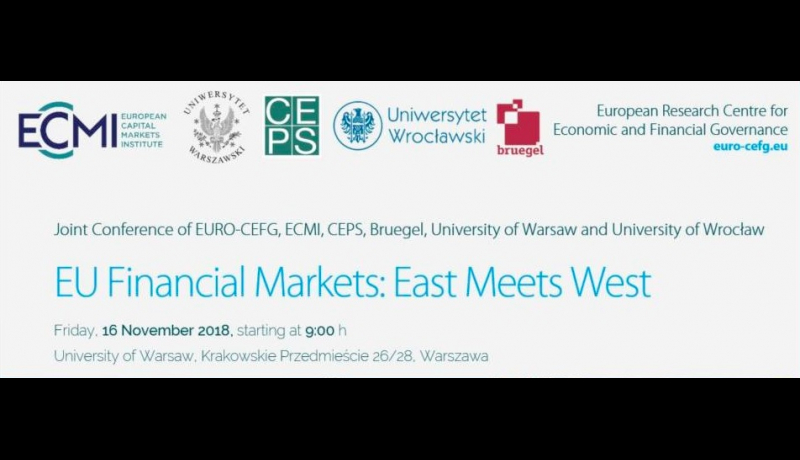EU Financial Markets: East Meets West
The European Union’s expansions of 2004 and 2007 brought about extension of the single market for financial services to the countries of the Central and Eastern European Union (CEEU). As a result, the financial institutions established in the CEEU region are today subject to the same EU regulatory framework as their western European counterparts. Many also belong to the same groups that dominate the western financial landscape. This, however, did not obliterate the differences in the development of financial services and in the roles played by the financial institutions in the western and the eastern part of the EU.
On the one hand, the western EU countries have been politically consolidated as a single currency area whose resilience was put to a severe test when the 2008 financial crisis revealed the excessive links between the area’s banks and sovereigns, and exposed the limitations of ‘home country control’ in financial supervision. This resulted in the political impulse for the establishment of a stronger regulatory framework for banking, known as the Banking Union, presently comprising the Single Supervisory Mechanism (SSM) and the Single Resolution Mechanism (SRM).
On the other hand, the smaller but more resilient financial sectors of the CEEU countries have proved able to cushion, rather than exacerbate, the global macroeconomic shocks of the past decade. Subsidiaries of the euro area banking groups operating in the region were less burdened by the unsound business practices that plagued their western parents. Moreover, relatively small proportion of banking assets to national GDPs of the CEEU countries allowed to limit the ‘too big to fail’ problem. Nevertheless, specific regulatory issues, such as gaps in anti-money laundering compliance, negatively affected the perception of some financial operators in the region. In addition, while smaller CEEU economies gradually joined the euro area, the larger countries of the region remained outside, and therefore outside the Banking Union. This exposes the cross-border banking groups operating in these countries to persistent exchange rate risks and home-host supervisory issues.
The European Research Centre for Economic Governance of the Universities of Leiden, Delft and Rotterdam and the Centre for European Economic Law and Governance at the University of Wroclaw organise, together with the University of Warsaw, the European Capital Markets Institute (ECMI), the Centre for European Policy Studies (CEPS) and Bruegel organise a high-level conference in Warsaw on 'Banking and Financial Regulation in the East and the West'. This conference brings together high-level experts from academia, from regulators and from banks coming from the West and from the East to discuss differences and similarities of financial markets in the East and the West and their needs for regulation.
09:00 – 09:10 Welcome Addresss
- Prof. UWr. dr. hab. Dariusz Adamski, University of Wrocław, Centre for European Economic Law and Governance
09:10 – 09:30 Introductory Notes
- Paweł Samecki, Member of the Management Board, Narodowy Bank Polski
09:30 – 10:00 Keynote Speech
- Dr. Elke König, Chair of the Single Resolution Board (SRB)
10:00 – 11:20 Panel 1. Regional Differences in Financial Intermediation: the Eastern and Western EU
- Andrzej Banasiak, Polish Bank Association – tbc
- Willem Pieter De Groen, Centre for European Policy Studies (CEPS)
- Prof. Dr. Christos V. Gortsos, National and Kapodistrian University of Athens
Moderated by Tomáš Nidetzký, Board Member, Česká národní banka
11:20 – 11:40 Coffee
11:40 – 13:00 Panel 2. The Euro Area and Its Neighbours: Links and Prospects for the Financial Sector
- Dr. René Repasi, EURO-CEFG, Erasmus University Rotterdam
- Nina Stoyanova, Deputy Governor, Bulgarian National Bank
- Nicolas Véron, Bruegel, Brussels
Moderated by Dr. Olga Szczepańska, Department of Financial Stability, Narodowy Bank Polski
13:00 – 13:40 Lunch
13:40 – 15:00 Panel 3. Social Utility of the Financial System: the Role of Regulation and Supervision
Panel debate
- Prof. UWr. dr. hab. Dariusz Adamski, University of Wrocław
- Prof. Dr. Jens-Hinrich Binder, Eberhard Karls University Tübingen
- Prof. Dr. Kleis W.H. Broekhuizen, Erasmus University Rotterdam
Moderated by Dr. Anna Gardella, Banking Markets, Innovation and Products Unit, European Banking Authority (EBA)
15:00 – 15:20 Coffee
15:20 – 16:40 Panel 4. Capital Markets Union: EU-wide Capital Market or Regional Consolidation?
- Prof. Dr. Matthias Haentjens, Leiden University
- Jacek Kubas, Local Capital Markets, European Bank for Reconstruction and Development (EBRD)
- Dr. Diego Valiante, DG FISMA, European Commission – tbc
Moderated by Dr. Jakub Michalik, European Securities and Markets Authority (ESMA)
16:40 – 17:00 Concluding Words
- Prof. Dr. Fabian Amtenbrink, Scientific Director EURO-CEFG, Erasmus University Rotterdam

